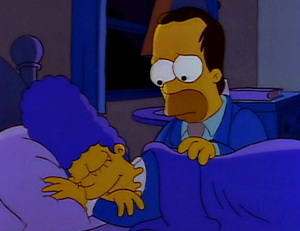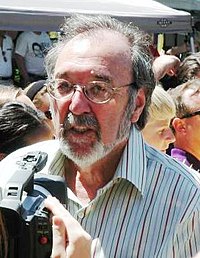
Homer Jay Simpson is the protagonist of the American animated sitcom The Simpsons. He is voiced by Dan Castellaneta and first appeared, along with the rest of the Simpsons, in The Tracey Ullman Show short "Good Night" on April 19, 1987. Homer was created by the cartoonist Matt Groening while he was waiting in the lobby of producer James L. Brooks's office. Groening had been called to pitch a series of shorts based on his comic strip Life in Hell but instead created a new set of characters. He named the character after his father, Homer Groening. After appearing for three seasons on The Tracey Ullman Show, the Simpsons received their own series on Fox, which debuted on December 17, 1989.

Margaret Lenny "Maggie" Simpson is a fictional character in the animated television series The Simpsons and the youngest member of the Simpson family. She first appeared on television in the Tracey Ullman Show short "Good Night" on April 19, 1987. Maggie was created and designed by cartoonist Matt Groening while he was waiting in the lobby of James L. Brooks' office. She received her first name from Groening's youngest sister. After appearing on The Tracey Ullman Show for three years, the Simpson family was given their own series on the Fox Broadcasting Company which debuted December 17, 1989.

Barnard "Barney" Gumble is a recurring character in the American animated TV series The Simpsons. He is voiced by Dan Castellaneta and first appeared in the series premiere episode "Simpsons Roasting on an Open Fire".

The Critic is an American primetime adult animated sitcom revolving around the life of New York film critic Jay Sherman, voiced by Jon Lovitz. It was created by writing partners Al Jean and Mike Reiss, who had previously worked as writers and showrunners on seasons 3 and 4 of The Simpsons. The Critic had 23 episodes produced, first broadcast on ABC in 1994, and finishing its original run on Fox in 1995.

Alfred Ernest Jean III is an American screenwriter and producer. Jean is well known for his work on The Simpsons. He was raised near Detroit, Michigan, and graduated from Harvard University in 1981. Jean began his writing career in the 1980s with fellow Harvard alum Mike Reiss. Together, they worked as writers and producers on television shows such as The Tonight Show Starring Johnny Carson, ALF and It's Garry Shandling's Show.
"Brush with Greatness" is the eighteenth episode of the second season of the American animated television series The Simpsons. It originally aired on the Fox Network in the United States on April 11, 1991. In the episode, Marge enrolls in an art class after Lisa encourages her to revive her former interest in painting. When she wins first prize in a local art competition for a portrait of Homer on the couch in his underwear, Mr. Burns commissions her to paint his portrait. In the subplot, Homer is determined to lose weight after getting stuck in a water slide at an amusement park.

Michael L. Reiss is an American television comedy writer. He served as a showrunner, writer, and producer for the animated series The Simpsons and co-created the animated series The Critic. He created and wrote the webtoon Queer Duck; he has also written screenplays including: Ice Age: Dawn of the Dinosaurs, The Simpsons Movie and My Life in Ruins.

"The Way We Was" is the twelfth episode of the second season of the American animated television series The Simpsons. It originally aired on the Fox network in the United States on January 31, 1991. In the episode, Marge tells the story of how she and Homer first met and fell in love. Flashing back to 1974, it is shown how Homer falls in love with Marge in high school and tries to get close to her by enlisting her as his French tutor. After several hours of verb conjugation, Marge falls for Homer too, only to become enraged when he admits he is not a French student. Marge rejects Homer's invitation to the prom and goes with Artie Ziff. Artie turns out to be a terrible date and Marge realizes that it is Homer she really wants.
"A Streetcar Named Marge" is the second episode of the fourth season of the American animated television series The Simpsons. It first aired on the Fox network in the United States on October 1, 1992. In the episode, Marge wins the role of Blanche DuBois in a community theatre musical version of Tennessee Williams' A Streetcar Named Desire. Homer offers little support for his wife's acting pursuits, and Marge begins to see parallels between him and Stanley Kowalski, the play's boorish lead male character. The episode contains a subplot in which Maggie Simpson attempts to retrieve her pacifier from a strict daycare owner.

"I Married Marge" is the twelfth episode of the third season of the American animated television series The Simpsons. It originally aired on the Fox network in the United States on December 26, 1991. In the episode, Marge worries that she may be pregnant again and visits Dr. Hibbert's office. While anxiously waiting at home, Homer tells Bart, Lisa, and Maggie the story of his and Marge's marriage and Bart's birth. The episode was written by Jeff Martin and directed by Jeffrey Lynch.
"The War of the Simpsons" is the twentieth episode of the second season of the American animated television series The Simpsons. It originally aired on the Fox network in the United States on May 2, 1991. In the episode, Homer gets drunk at a dinner party and embarrasses Marge, so she enrolls them in marriage counseling at a lakeside retreat with Reverend Lovejoy.
"Two Dozen and One Greyhounds" is the twentieth episode of the sixth season of the American animated television series The Simpsons. It originally aired on the Fox network in the United States on April 9, 1995. The episode was written by Mike Scully and directed by Bob Anderson. Frank Welker guest stars as Santa's Little Helper and various other dogs. In the episode, Santa's Little Helper has puppies with a dog that he met at the greyhound racetrack.
"Principal Charming" is the fourteenth episode of the second season of the American animated television series The Simpsons. It originally aired on the Fox network in the United States on February 14, 1991. In the episode, Marge asks Homer to find a husband for her sister Selma. Homer invites Principal Skinner to dinner after Bart gets caught vandalizing the school's lawn. Skinner's dinner with the Simpsons fails to go as planned when he instead falls for Selma's twin sister Patty.

The sixth season of the American animated television series The Simpsons originally aired on the Fox network between September 4, 1994, and May 21, 1995, and consists of 25 episodes. The Simpsons is an animated series about a working class family, which consists of Homer, Marge, Bart, Lisa, and Maggie. The show is set in the fictional city of Springfield, and lampoons American culture, society, television and many aspects of the human condition.

The fifth season of the American animated television series The Simpsons originally aired on the Fox network between September 30, 1993, and May 19, 1994. The showrunner for the fifth production season was David Mirkin who executive produced 20 episodes. Al Jean and Mike Reiss executive produced the remaining two, which were both hold overs that were produced for the previous season. The season contains some of the series' most acclaimed and popular episodes, including "Cape Feare", "Lisa vs. Malibu Stacy", "Homer Goes to College", "Deep Space Homer", and "Rosebud". It also includes the 100th episode, "Sweet Seymour Skinner's Baadasssss Song". The season was nominated for two Primetime Emmy Awards and won an Annie Award for Best Animated Television Program as well as an Environmental Media Award and a Genesis Award. The DVD box set was released in Region 1 on December 21, 2004, Region 2 on March 21, 2005, and Region 4 on March 23, 2005.

The fourth season of the American animated television series The Simpsons originally aired on the Fox network between September 24, 1992, and May 13, 1993, beginning with "Kamp Krusty". The showrunners for the fourth production season were Al Jean and Mike Reiss, with the season being produced by Gracie Films and 20th Century Fox Television. The aired season contained two episodes which were hold-over episodes from season three, which Jean and Reiss also ran. Following the end of the production of the season, Jean, Reiss and most of the original writing staff left the show. The season was nominated for two Primetime Emmy Awards and Dan Castellaneta would win one for his performance as Homer in "Mr. Plow". The fourth season was released on DVD in Region 1 on June 15, 2004, Region 2 on August 2, 2004, and in Region 4 on August 25, 2004.

The third season of the American animated television series The Simpsons originally aired on the Fox network between September 19, 1991, and August 27, 1992. The showrunners for the third production season were Al Jean and Mike Reiss who executive produced 22 episodes for the season, while two other episodes were produced by James L. Brooks, Matt Groening, and Sam Simon, with it being produced by Gracie Films and 20th Century Fox Television. An additional episode, "Brother, Can You Spare Two Dimes?", aired on August 27, 1992, after the official end of the third season and is included on the Season 3 DVD set. Season three won six Primetime Emmy Awards for "Outstanding Voice-Over Performance" and also received a nomination for "Outstanding Animated Program" for the episode "Radio Bart". The complete season was released on DVD in Region 1 on August 26, 2003, Region 2 on October 6, 2003, and in Region 4 on October 22, 2003.

The second season of the animated television series The Simpsons originally aired on the Fox network between October 11, 1990, and July 11, 1991, and contained 22 episodes, beginning with "Bart Gets an "F". Another episode, "Blood Feud", aired during the summer after the official season finale. The executive producers for the second production season were Matt Groening, James L. Brooks, and Sam Simon, who had also been executive producers for the previous season. It was produced by Gracie Films and 20th Century Fox Television. The DVD box set was released on August 6, 2002, in Region 1, July 8, 2002 in Region 2 and in September 2002 in Region 4. The episode "Homer vs. Lisa and the 8th Commandment" won the Primetime Emmy Award for Outstanding Animated Program, and was also nominated in the "Outstanding Sound Mixing for a Comedy Series or a Special" category.

The Simpsons is an American animated television sitcom starring the animated Simpson family, which was created by Matt Groening. He conceived of the characters in the lobby of James L. Brooks's office and named them after his own family members, substituting "Bart" for his own name. The family debuted as shorts on The Tracey Ullman Show on April 19, 1987. After a three-season run, the sketch was developed into a half-hour prime time show called The Simpsons, which debuted on December 17, 1989. The show was an early hit for Fox, becoming the first Fox series to land in the top 30 ratings in a season (1990).















